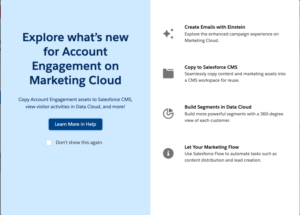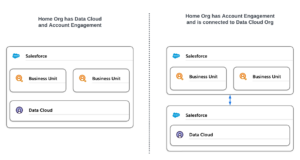Pardot Renamed “Marketing Cloud Account Engagement”
- April 6, 2022
- Marketing Cloud Account Engagement, Salesforce Ben | The Drip

Announced at Salesforce World Tour Sydney, a number of Marketing Cloud product names are changing. Pardot, one of Salesforce’s marketing automation tools, will be renamed to Marketing Cloud Account Engagement.
Here are the reasons driving these changes, and what this will mean to the Pardot community.
Why is Pardot’s Name Changing?
This move is one part of an initiative called “MC Easy”, which has branched off from the company-wide “Salesforce Easy” innovation goal. Making Marketing Cloud’s expansive product suite consistent and immediately understandable is how Salesforce hopes to align everyone’s understanding – from customers, partners, and even internal teams.
Here is a summary of the reasons behind “MC Easy”. You can read the full coverage here.
- Marketing Cloud is made up of “Studios”, “Builders”, and add-ons that have retained their original name (after being acquired by Salesforce). The whole scope of Marketing Cloud is challenging for anyone to initially understand. Salesforce acknowledged that the vocabulary they’ve used has been inconsistent.
- Salesforce believe the changes will facilitate how we talk about the products across different Salesforce “clouds” (that are used by different teams, in most organizations).
- Salesforce want Marketing Cloud features to “speak the language of the customer”. What’s conversational? How does each products’ name associate with what it should deliver? Put yourself in the shoes of an organization evaluating SFMC and its competitors.
- Finally, to align better with analyst reports, for example, Gartner’s magic quadrants.
Read more: Salesforce Renames 6 Marketing Cloud Products
Read more: What is Salesforce Marketing Cloud? [Builders and Studios Overview]
The Question Marks (Commentary)
These are significant changes that won’t happen overnight, especially when it comes to detangling product features and users adopting the terminology. Here are some implications this will have on the Pardot community.
Again, this is a shortened version aimed specifically to Pardot specialists; you can read the full commentary that addresses the Marketing Cloud changes.
B2B vs B2C
Salesforce attempted to lift the binary B2B/B2C split between Pardot and Marketing Cloud a handful of years ago. As you will hear, the adjusted messaging was that Pardot is better suited to “considered” purchases. The reality is that Pardot have B2C customers (and likely SFMC have transactional B2B customers).
Renaming Pardot “Account Engagement”, seems to some people, that the split is now being reinforced.
Salesforce says that Pardot “Account Engagement” will enable us to speak “side-by-side” with SFMC. They have acknowledged that customers don’t fall neatly into the B2B or B2C boxes – their intention is not to split them, but to bring the two sides together.
Pardot’s Product Architecture is Different
Is Pardot considered a piece of Marketing Cloud? Over time, it’s been passed around (from Marketing Cloud, to Sales Cloud, now back to Marketing Cloud) – at one point, Pardot’s marketing has been the responsibility of Marketing Cloud teams, and its sales have been handled by the Sales Cloud (“core”) Account Executives. My opinion is that this is a sensible split – but one that perhaps caused misalignment internally where AEs should weigh up Pardot and Marketing Cloud, equally.
While the fabricated “Marketing Cloud Account Engagement” is a part of Marketing Cloud by name, technically speaking, Pardot’s architecture (eg. data models) are totally separate from Marketing Cloud’s. In fact, Pardot currently enjoys a tighter integration to the Salesforce core platform, thanks to the push from product development over the past few years.
Examples of how this has come into fruition include Connected Campaigns, Marketing Asset Sync, and the Lightning Email/Landing Page Builders. Not to mention the Pardot Lightning App, which has paid off in the long run. Marketing Cloud doesn’t come close to this level of connection.
The Term “Engagement”
“Engagement” is the new umbrella for communication types, and to many people’s dismay, incorporated into Pardot’s new name.
Anyone familiar with Pardot will already have heard the word “Engagement” crop up too often, by some measures. You only need to skim the Engagement History feature set to see how this term is repeated in different ways – trust me, I worked with Lindsey to make the infographic, and it was a tricky one to get down “on paper”.
There’s also Engagement Studio, Salesforce Engage (a Pardot add-on for Sales Cloud users), and likely other examples throughout the wider Salesforce platform.
Pardot and the Account Object
“Account Engagement” is puzzling to those who understand how the Pardot-Salesforce connector data sync works. Pardot works mainly with the Lead/Contact objects (a bi-directional create/update between Salesforce and Pardot), whereas the Account object is read-only.
Read more: Pardot + Salesforce Accounts: 6 Ways They Can Work Better Together
Account-based Marketing vs Account Engagement
Although there has been a smattering of “Account” based enhancements over the past few releases, Pardot is far from an account-based marketing (ABM) platform. Pardot’s relationship to the Account object still leaves much to be desired. Naturally, one would ask if there are ABM features on the product roadmap; at this time, Salesforce can’t confirm that there are.
Until then, no doubt consultants and trainers are looking forward to explaining that difference to their clients.
Perhaps the product marketing teams aren’t putting “the cart before the horse”. You can lean on Salesforce to execute some ABM strategies, and perhaps product development will double-down with Salesforce as the “wind in their sails”.
Nonprofits Who Use Pardot
Nonprofits make up a small, but mighty segment of the market. Pardot is used by these organizations, encouraged as part of Salesforce’s philanthropic 1-1-1 commitment.
Not only does the nonprofit space use Pardot to do B2C marketing, but also “Account” isn’t a term that appears in the Nonprofit Success Pack (NPSP). These are concerns that could leave these organizations confused, or alienated, at the very worst.
Troubleshooting
“Pardot” is recognizable. It points to the specific product (as I mentioned, Pardot and Marketing Cloud are totally separate, technically speaking). Plus, as one word, it’s simpler to articulate issues. Going from a one-word product name to four could cause unnecessary overhead.
Imagine someone, who you support, approaches you with issues accessing their Marketing Cloud Account Engagement account. Or that Marketing Cloud Account Engagement completion actions are playing up? Let’s hope there will be shortcuts to how we can communicate technical questions.
Consultancy Skill-sets
Another consequence of the generic names is that skill-sets now also sound generic. The concern is that the new names do not reflect the specialization in this technology, the expertise that Pardot specialists have worked years to master. One reaction summed this up perfectly:
“I’m certified in “account engagement” sounds a LOT less prominent than how we announce these things today to our clients or colleagues. Sounds like something I could knock out in 30 minutes on LinkedIn Learning.”
A huge adjustment is going to be required from recruiters, too, more than a crash course!
Pardot Trailblazer Community
Pardot was founded in 2007, and is a name that’s become a community identity. The thriving Pardashians Slack community is a good example. Now we’re wondering: “What will we call the Pardashians going forward? Engashians?”
Salesforce’s hope is that we can become one big community (versus sub-communities). The “Moment Marketer” community is one way Salesforce plan for everyone to unite.
Summary: A look into the future?
My aim wasn’t to come across as negative in this article – instead, I set out to report a balanced view of both the reasons behind these changes and what this will mean to the Pardot community.
Look deeper, and you may speculate on what the future could bring. As Salesforce’s marketing technologies become tighter with the core Salesforce platform, “cross-cloud” collaboration is getting ever more attention. Could more Account-Pardot functionality solidify the name change?
We’re encouraged to think about how is the name change going to pay off in the long term. I wish the Marketing Cloud marketing teams the best of luck with the major task ahead!
Maybe we should ask: “Will people finally stop saying Pardeaux?”
This Pardot article written by:
Salesforce Ben | The Drip
Lucy Mazalon is the Head Editor & Operations Director at Salesforceben.com, Founder of THE DRIP and Salesforce Marketing Champion 2020.
Original Pardot Article: https://www.salesforceben.com/the-drip/pardot-renamed-marketing-cloud-account-engagement/
Find more great Pardot articles at www.salesforceben.com/the-drip/
Pardot Experts Blog
We have categorized all the different Pardot articles by topics.
Pardot Topic Categories
- Account Based Marketing (ABM) (7)
- Business Units (14)
- ChatGPT / AI (3)
- Completion Actions (5)
- Connectors (10)
- Custom Redirects (4)
- Data Cloud (3)
- Demand Generation (8)
- Dynamic Content (7)
- Einstein Features (11)
- Email Delivery (17)
- Email Open Rates (3)
- Pardot A/B Testing (2)
- Email Mailability (16)
- Do Not Email (1)
- Double Opt-in (2)
- Opt Out / Unsubscribe (14)
- Email Preferences Page (6)
- Engagement Studio (16)
- Industries (1)
- Non Profit (1)
- Landing Pages (9)
- Lead Generation (1)
- Lead Management (13)
- Lead Routing (3)
- Lead Scoring (16)
- Leads (3)
- Marketing Analytics – B2BMA (9)
- Marketing Automation (1)
- Marketing Cloud (3)
- Marketing Cloud Account Engagement (4)
- Marketing Cloud Growth (2)
- New Pardot Features (6)
- Opportunities (2)
- Optimization (2)
- Pardot Admin (65)
- Duplicates (1)
- Marketing Ops (1)
- Pardot Alerts (1)
- Pardot API (2)
- Pardot Automations (3)
- Pardot Careers (12)
- Pardot Certifications (4)
- Pardot Consulting (1)
- Pardot Cookies (4)
- Pardot Custom Objects (3)
- Pardot Email Builder (8)
- Pardot Email Templates (10)
- HML (6)
- Pardot Events (17)
- Pardot External Actions (1)
- Pardot External Activities (4)
- Pardot Forms (29)
- Form Handlers (8)
- Pardot Integrations (21)
- Data Cloud (2)
- Slack (1)
- Pardot Lead Grading (5)
- Pardot Lead Source (2)
- Pardot Lightning (1)
- Pardot Migration (1)
- Pardot Nurture / Drip Campaigns (2)
- Pardot Personalization (3)
- Pardot Profiles (1)
- Pardot Releases (18)
- Pardot Sandboxes (2)
- Pardot Segmentation (5)
- Pardot Strategy (7)
- Pardot Sync (2)
- Pardot Sync Errors (1)
- Pardot Tracker Domains (5)
- Pardot Training (3)
- Pardot Vs Other MAPs (4)
- Pardot Website Tracking (2)
- Reporting (22)
- Salesforce and Pardot (31)
- Marketing Data Sharing (2)
- Pardot Users (3)
- Salesforce Automation (5)
- Salesforce Flows (2)
- Salesforce Campaigns (22)
- Salesforce CRM (3)
- Record Types (1)
- Salesforce Engage (3)
- Salesforce Queues (2)
- Security and Privacy (1)
- Tags (3)
- The Authors (540)
- Cheshire Impact (9)
- Greenkey Digital (55)
- Invado Solutions (37)
- Jenna Molby (9)
- Marcloud Consulting (6)
- Nebula Consulting (67)
- Pardot Geeks (44)
- Salesforce Ben | The Drip (242)
- SalesLabX (16)
- Slalom (4)
- Unfettered Marketing (51)
- Uncategorized (1)
- Website Tracking (2)
- Website Search (1)
More Pardot Articles
See all posts
This Pardot article written by:
Salesforce Ben | The Drip
Lucy Mazalon is the Head Editor & Operations Director at Salesforceben.com, Founder of THE DRIP and Salesforce Marketing Champion 2020.
Original Pardot Article: https://www.salesforceben.com/the-drip/pardot-renamed-marketing-cloud-account-engagement/
Find more great Pardot articles at www.salesforceben.com/the-drip/







